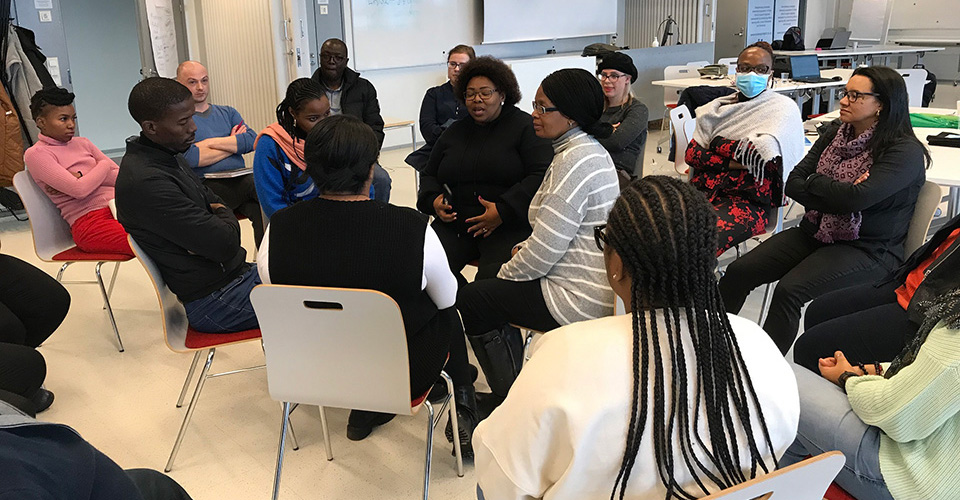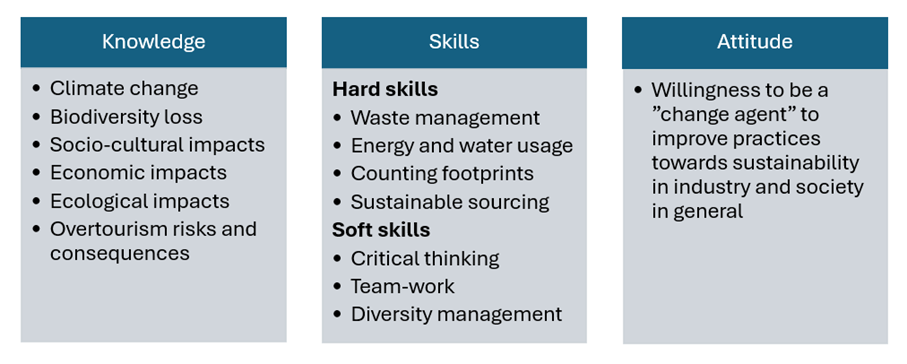
Eva Holmberg & Annika Konttinen
There is a consensus that understanding sustainable development is a core competency for tourism students, enabling them to address sustainability challenges (Wiek et al., 2011; Leiva-Brondo et al., 2022; Brundiers et al., 2021). Also, students should ideally possess “sustainability literacy”, which encompasses the knowledge, skills and mindsets necessary for individuals to commit to building a sustainable future (Mason, 2019).
Achieving the United Nations Sustainable Development Goals (SDGs) requires the ability to identify and address sustainability issues and problems (Perkins et al., 2019), areas where university education plays a crucial role (Leiva-Brondo et al., 2022). As tourism is a global industry, this article is based on six focus group interviews and four training workshops with Finnish and South African tourism lecturers to explore their views on the sustainability literacy necessary for careers in tourism.
The lecturers described sustainability literacy in terms of knowledge about tourism’s impacts and ethics. It was also acknowledged that as tourism contributes to jobs and income, the financial aspects of sustainability are important too. Sustainability literacy is also strongly linked to knowledge about nature as a resource for tourism. Additionally, generic skills such as teamwork and critical thinking are essential competences for employees aiming to contribute to a sustainable future in the tourism industry.
Sustainability challenges in tourism
In recent years, the need for sustainability has been heightened for instance by the Covid pandemic and the devastating impact the lockdowns imposed on the tourism industry, its destinations, businesses and employees.
It has been estimated by UNWTO (2022) that 100 million jobs were at risk and in the year 2020 alone, 50 million tourism jobs were lost, with millions of employees leaving the industry even after that, many for good. It was only in 2024 that tourism reached most of its pre-pandemic levels with arrivals and contribution to the global economy.
Also, the Russian war against Ukraine has impacted destination and airline choices and caused further damage to the already heavily impacted industry. The crises of Covid, climate change, conflicts, and cost of living, as coined in the World YMCA (2024) report, have had a lasting impact on both the youth and the tourism industry.
Overtourism is rearing its ugly head yet again, especially in Europe, where the local population is demonstrating against tourism and its adverse effects on their lives in many destinations ranging from Mallorca and Santorini to Barcelona and Rovaniemi (Smith 30.8.2024; Niranjan 6.9.2024; Kalin & Numminen 12.9.2024).
As the tourism industry is likely to face more crises in the future, graduates from tourism and hospitality programmes need to possess many competences to succeed in their careers in the industry. Achieving the Agenda 2030 requires understanding sustainability, identifying issues that impact sustainability as well as solving sustainability-related problems (Cotterell, 2019; Perkins et al., 2019), topics where university education plays a major role (Leiva-Brondo et al., 2022).
Sustainability is a complex concept because it means different things to different people, as we noticed throughout our project and the data collection.
This article is based on six focus group interviews and four training workshops with Finnish and South African tourism lecturers to explore their views on the sustainability literacy necessary for careers in tourism. In 2023, during the Erasmus Plus SUCSESS project focusing on enhancing employability of South African university graduates, we had the opportunity to conduct three focus group interviews with tourism educators in Finland and three in South Africa. The four training workshops were held in 2021-2022: two of them were online (due to Covid), one in South Africa and one in Finland.
Enhancing sustainability literacy among tourism students
“Sustainability Literacy” refers to the knowledge, skills and mindsets that allow individuals to become deeply committed to building a sustainable future and assisting in making informed and effective decisions to this end (United Nations, 2020). Sustainability literacy is crucial for the ability to work for a sustainable future, e.g., achieving the United Nations Sustainable Development Goals (SDGs). (Campell et al., 2021; Mason, 2019).
Reports by international organisations (OECD 2024; WEF 2023) and businesses (Manpower 2023), agree that sustainability literacy is important for employees to succeed in their jobs. Many companies state that their number one job creator is the green business transformation, but they do not have the talent to fulfil their sustainability goals (Manpower, 2023).
Today most students belong to Generation Z (born 1996-2010), known for their focus on sustainability (McKinsey & Company 28.8.2024). Studies (see, e.g., Ziska & Varga, 2021) have shown that students are interested in sustainability topics.
As the concept of sustainability literacy is so closely linked to action (Campell et al., 2021), it is insufficient for tourism graduates to merely be interested in the topic. They must be capable of taking action, have “implementation competency” (Brundiers et al., 2021; Redman & Wiek, 2021) and assuming responsibility to promote sustainability within organisations.
Figure 1 summarises the main aspects of sustainability literacy in tourism based on the focus group interviews and workshops conducted during the four year-long SUCSESS project. First, to gain sustainability literacy, students need knowledge about major challenges affecting the tourism industry such as climate change and the loss of biodiversity. Second, they need hard (industry-related) skills such as energy and waste management, footprint calculations and sustainable sourcing, and soft skills such as critical thinking, teamwork and diversity management. Third, graduates should have a proactive mindset aimed at advancing a more sustainable tourism industry. This includes developing the attitude and motivation necessary to act as change agents in sustainability.

Further, an important issue to consider is how university lecturers could strengthen the sustainability literacy of their students. Learning methods that focus on memorising facts do not support this goal, as students need to be able to apply their knowledge in practice. Experiential learning approaches are implemented at universities of applied sciences and the data collected during the SUCSESS project indicate that tourism students require concrete examples, such as field trips, guest lectures, and business collaborations to cultivate a strong commitment to becoming sustainability change agents.
Moreover, with technology boosting student engagement (Steward & Gorman, 2023), lecturers in both countries found digital tools like Padlet and footprint calculators valuable for advancing sustainability literacy in students. Given the importance of soft skills such as teamwork and critical thinking in sustainability literacy, learning tasks should be complex and ideally tackled by student teams.
Lecturers do not need to be experts in sustainability to enhance sustainability literacy. Although many Finnish educators claimed that they are not sustainability experts, rather experts in other fields, they were nevertheless confident to include and tackle sustainability topics in their teaching. Indeed, Steward & Gorman (2023) suggest that linking sustainable tourism courses with other courses may enable students to develop a deeper understanding of the complex challenges facing the tourism industry.
Although international organisations like McKinsey & Company (28.8.2024) and the World Economic Forum (18.3.2022) state that the young generation is very concerned about sustainability, our interviewees mentioned that it is not that relevant for many of their tourism students. One South African lecturer put it this way:
And they may not be caring about sustainability. They’re hearing about it. They’re learning about it, but it might not be something that’s necessarily going to be the forefront of their thinking. They’re thinking I need a job, and I’m going to now work in the tourism sector, perhaps later on in their careers once they’re more established…So I think getting students to think about sustainability now and actually care about it is the challenge. How do we get them to actually care that sustainability is something they should be thinking about?
Based on our interviews with tourism lecturers, Finnish tourism students are interested in specific sustainability issues like climate anxiety and flight shame, working conditions in the tourism industry and DEI (diversity, equality, inclusion) topics, whereas in South Africa the more immediate concerns are about getting a job in the industry. Topics like overtourism were not seen as relevant in the South African context, but the lecturers agreed that their students need to be exposed to issues like that to understand the global situation.
Conclusions
Students need critical thinking and an ability to solve complex problems to be able to work towards the SDGs and sustainable tourism in their future careers. Traditional teaching methods can increase understanding and improve skills, but there is little evidence whether sustainability education can provide students with an ability to act for a sustainable future.
Our interviewees, at least, found that the experiential learning methods where students are in the center of all activity, enhance the ability to drive change. Also, integrating technology and digital tools into sustainability education actively engages students and improves their chances of achieving sustainability literacy.
However, in the absence of knowledge of the basics of sustainable tourism, it is difficult to build on the skills and attitudes. The realities on the ground are very different in Finland and South Africa. Nevertheless, the topics our interviewees identified as relevant to sustainability literacy were remarkably similar. They included knowledge of sustainable tourism, both hard and soft skills, and ways to equip students to address sustainability challenges in their future careers.
Authors
Eva Holmberg, Lic (Econ.), Educator, Novia UAS, eva.holmberg(at)novia.fi
Annika Konttinen, MSc (Econ.), Senior Lecturer, Haaga-Helia UAS, annika.konttinen(at)haaga-helia.fi
References
Brundiers, K., Barth, M., Cebrián, G., Cohen, M., Diaz, L., Doucette-Remington, S., Dripps, W., Habron, G., Harre, N., Jarchows, M., Losch, K., Michel, J., Mochizuki, Y., Rieckmann, M., Parnell, R., Walker, P. & Zint, M. (2021). Key competencies in sustainability in higher education – toward an agreed-upon reference framework. Sustainability Science 16, 13–29. https://doi.org/10.1007/s11625-020-00838-2.
Campbell, C., Lacković, N. & Olteanu, A. (2021). A “Strong” Approach to Sustainability Literacy: Embodied Ecology and Media. Philosophies 6, no. 1: 14. https://doi.org/10.3390/philosophies6010014.
Cotterell, D., Hales, R., Arcodia, C. & Ferreira, J. A. (2019). Overcommitted to tourism and under committed to sustainability: the urgency of teaching “strong sustainability” in tourism courses. Journal of Sustainable Tourism, 27(7), 882–902. https://doi.org/10.1080/09669582.2018.1545777.
Kalin, O. & Numminen, J. (2024). “Kotirauha on viety” – Asukkaat suuttuivat matkailijoiden asuntomajoituksesta Rovaniemellä. https://www.hs.fi/suomi/art-2000010691365.html.
Leiva-Brondo, M., Lajara-Camilleri, N., Vidal-Meló, A., Atarés, A. & Lull, C. (2022). Spanish University Students’ Awareness and Perception of Sustainable Development Goals and Sustainability Literacy. Sustainability 2022, 14, 4552. https://doi.org/10.3390/su14084552.
McKinsey & Company. (2024). What is Gen Z? https://www.mckinsey.com/featured-insights/mckinsey-explainers/what-is-gen-z#/.
Niranjan, A. (2024). ‘Flight shame is dead’: concern grows over climate impact of tourism boom. https://www.theguardian.com/news/article/2024/sep/06/flight-shame-climate-impact-tourism-boom-covid-environment-net-zero.
Perkins, K.M., Zepeda Quintana, D.S. & Velazquez, L. (2019). Sustainable Literacy. In: Leal Filho, W. (eds) Encyclopedia of Sustainability in Higher Education. Springer, Cham. https://doi.org/10.1007/978-3-030-11352-0_231.
ManpowerGroup (2023). The Greening World of Work. https://workforce-resources.manpowergroup.com/sustainability-and-esg/global-insights-green-jobs-report.
Mason, A.M. (2019). Sulitest®: A Mixed-Method, Pilot Study of Assessment Impacts on Undergraduate Sustainability-related Learning and Motivation. The Journal of Sustainability Education. 2019, 20. https://www.susted.com/wordpress/content/sulitest-a-mixed-method-pilot-study-of-assessment-impacts-on-undergraduate-sustainability-related-learning-and-motivation_2019_05/.
OECD (2024). Education at a Glance 2024: OECD Indicators. OECD Publishing, Paris. https://doi.org/10.1787/c00cad36-en.
Redman, A. & Wiek, A. (2021). Competencies for Advancing Transformations Towards Sustainability. Frontiers in Education. 6. 484. https://doi.org/10.3389/feduc.2021.785163.
Smith, H. (2024). ‘Everywhere jam-packed’: mayor of Santorini warns of overtourism crisis. https://www.theguardian.com/world/article/2024/aug/30/mayor-of-santorini-warns-of-overtourism-crisis-greece.
Stewart, J. & Gorman, C. (2023). Authentic Assessment and Embedding Sustainable Literacy and Technology Skills in Tourism Education. Irish Journal of Academic Practice: Vol. 11: Iss. 2, Article 10. https://doi.org/10.21427/t69s-xb70.
United Nations (2020). Raising awareness and assessing sustainability literacy on SDG 7. https://sustainabledevelopment.un.org/sdinaction/hesi/literacy.
UNWTO (2022). Rethinking Tourism – From Crisis to Transformation. https://webunwto.s3.eu-west-1.amazonaws.com/s3fs-public/2022-09/from-crisis-to-transformation-WTD2022.pdf?VersionId=E2562wREejLJYZbb5IkplKFufBA9URdC.
Ziska, L. & Varga, P. (2021). Teaching Sustainability in Higher Education Institutions: Assessing Hospitality Students’ Sustainability Literacy. Journal of Hospitality & Tourism Education, 33(4), 242–257. https://doi.org/10.1080/10963758.2020.1726771.
Wiek, A., Withycombe, L. & Redman, C.L. (2011). Key competencies in sustainability: a reference framework for academic program development. Sustainability Science 6, 203–218. https://doi.org/10.1007/s11625-011-0132-6.
World Economic Forum (2022). Gen Z cares about sustainability more than anyone else – and is starting to make others feel the same. https://www.weforum.org/agenda/2022/03/generation-z-sustainability-lifestyle-buying-decisions/.
World Economic Forum (2023). The Future of Jobs Report 2023. https://www.weforum.org/publications/the-future-of-jobs-report-2023/.
World YMCA (2024). Future Ready: Reimagining Meaningful Work for Young People. https://www.ymca.int/wp-content/uploads/2024/07/001_Future-Ready_Reimagining-Meaningful-Work-for-Young-People-1.pdf.



